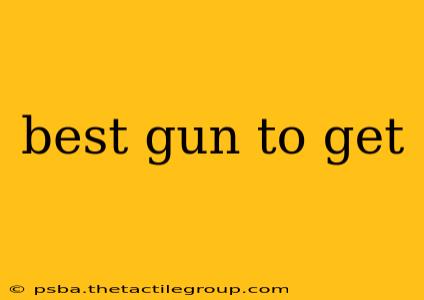Finding the Best Gun for You: A Comprehensive Guide
Choosing the right firearm is a deeply personal decision, and there's no single "best" gun for everyone. The ideal firearm depends heavily on your intended use, experience level, physical capabilities, and local regulations. This guide will help you navigate the process, focusing on key factors to consider before making your purchase.
Disclaimer: This information is for educational purposes only. Always check your local and state laws regarding firearm ownership and usage before purchasing any firearm. Safe gun handling practices are paramount; improper handling can lead to serious injury or death. Seek professional training from a certified firearms instructor.
1. Defining Your Needs: Purpose and Intended Use
Before browsing models, clearly define why you need a gun. Different firearms excel in different roles:
- Self-Defense: For home defense, a shotgun or handgun is often preferred. Shotguns offer a wide spread, but require more training. Handguns are more compact and easier to conceal, but demand precise shot placement.
- Sport Shooting: Target shooting, hunting, or competition will dictate the type and caliber of firearm. Rifles are common for long-range accuracy, while handguns are popular for speed and precision at closer ranges.
- Hunting: Hunting requires consideration of the game being hunted and the hunting environment. Rifles are common for big game, while shotguns are used for waterfowl and smaller game.
- Collecting: Collectors prioritize historical significance, rarity, and condition.
2. Key Factors to Consider: Caliber, Action Type, and Features
Once you know your purpose, research specific firearm attributes:
- Caliber: This refers to the diameter of the bullet. Larger calibers generally deliver more stopping power, but with increased recoil and less ammunition capacity. Smaller calibers offer more manageable recoil, higher capacity magazines, and often lower cost per round.
- Action Type: This describes how the firearm operates. Common types include:
- Semi-automatic: Fires one round per trigger pull, automatically reloading the next round.
- Revolver: Uses a revolving cylinder to hold multiple cartridges.
- Pump-action: Requires manual reloading with each shot by pumping the action.
- Bolt-action: Requires manual reloading after each shot by operating the bolt.
- Features: Consider features like sights (iron sights, red dots, scopes), safety mechanisms, magazine capacity, and overall ergonomics. A comfortable and intuitive firearm is crucial for safe and effective use.
3. Experience Level and Physical Capabilities
Your experience level significantly impacts the right choice. Beginners should opt for firearms with manageable recoil and simple operation. Physical factors such as hand size, strength, and overall health also play a role in selecting a firearm that's comfortable and safe to handle.
4. Research and Due Diligence: Choosing a Reputable Manufacturer
Research reputable firearm manufacturers known for quality, reliability, and safety. Read reviews from experienced shooters, and consider attending a shooting range to test different firearms before making a purchase.
5. Legal Considerations and Responsible Gun Ownership
Thoroughly research and understand all federal, state, and local laws concerning firearm ownership, licensing, and usage. Responsible gun ownership includes proper storage, safe handling, and regular maintenance.
Conclusion: The Journey to Finding "The Best" Gun
The quest for the "best" gun is a journey of self-discovery and responsible research. By carefully considering your needs, capabilities, and legal obligations, you can find the firearm that best suits your individual circumstances. Remember, safety and proper training are paramount. Consult with a certified firearms instructor and engage in thorough research before making your decision.

